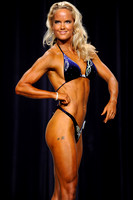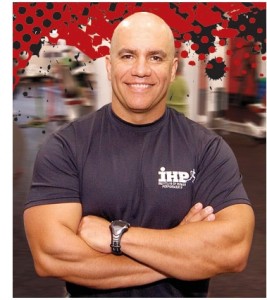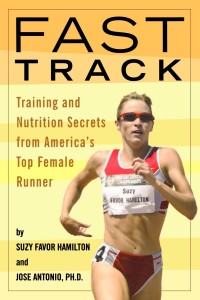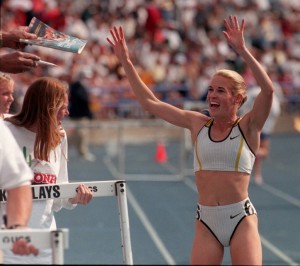 Dr. Volek: First let me thank you for the opportunity to discuss low carbohydrate diets. This has been a focus of my research for nearly 15 years. Low carbohydrate diets are commonly practiced but seldom taught. As a result, whether by design or neglect, mainstream medicine has either ignored or relegated this powerful tool to casual use. Together with Dr. Steve Phinney, a physician-scientist with extensive knowledge of low carbohydrate diets, we recently published a definitive book on the topic. In The Art and Science of Low Carbohydrate Living, we provide an unabridged and in-depth perspective on this controversial and often misunderstood topic.
Dr. Volek: First let me thank you for the opportunity to discuss low carbohydrate diets. This has been a focus of my research for nearly 15 years. Low carbohydrate diets are commonly practiced but seldom taught. As a result, whether by design or neglect, mainstream medicine has either ignored or relegated this powerful tool to casual use. Together with Dr. Steve Phinney, a physician-scientist with extensive knowledge of low carbohydrate diets, we recently published a definitive book on the topic. In The Art and Science of Low Carbohydrate Living, we provide an unabridged and in-depth perspective on this controversial and often misunderstood topic.
SNI: Define what a ‘low carbohydrate’ diet is? That is, at what % carbohydrate does a diet become low? Also, is there a difference between a ketogenic diet and a low-carb diet?
there a difference between a ketogenic diet and a low-carb diet?
Dr. Volek: Defining a low carbohydrate diet could be done in two ways:
What a Person Perceives: A low carbohydrate diet is one that limits carb intake to a level that results in resolution of all signs of carbohydrate intolerance. What’s carbohydrate intolerance? Like other food intolerances (lactose, gluten) carbohydrate intolerance is characterized by an undesirable response to carbohydrate. Since the inability to properly metabolize dietary carbohydrate is the direct result when insulin action is impaired, insulin resistance is synonymous with carbohydrate intolerance. In other words a low carbohydrate diet is one that improves the features of insulin resistance or metabolic syndrome. People vary widely in their level of carbohydrate intolerance. One person with early signs of metabolic syndrome may only need to restrict carbs to under 80 grams per day to lose weight and keep it off whereas another person may need to stay under 40 grams per day to put a frank case of type-2 diabetes into remission.
What Happens Metabolically: In this case, a low carbohydrate is defined by the level below which there is a fundamental shift away from glucose as a primary fuel that allows most of your daily energy needs to be met by fat, either directly as fatty acids or indirectly by ketone bodies made from fat. This process begins for most people when total carbohydrate is restricted to less than 60 grams per day. After a few weeks at this level, ketones begin to rise ~10 fold in plasma, resulting in a commensurate reduced need for glucose. Further restriction of carbs causes greater ketone production up to a point. The keto-adaptation that occurs gives human metabolism the flexibility to deal with famine or major shifts in available dietary fuels. This should not be confused with ‘diabetic ketoacidosis’ which is a completely different metabolic state.
SNI: What’s the data show regarding the effects of low carbohydrate diets on cardiovascular health?
Dr. Volek: How low fat and low carbohydrate diets impact risk for heart disease is one of the great nutrition debates of all time. For more than 3 decades, mainstream medicine and nutrition policy has been based on the diet-heart hypothesis. The syllogistic logic of the diet heart hypothesis is that lowering fat intake (specifically saturated fat) will decrease blood cholesterol which in turn will decrease risk of heart disease. Rather than growing stronger as new data has accumulated over the last 40 years, today the diet-heart paradigm is on razor thin ice, and the temperature is increasing. To understand why as a country we went down this path, no one has written a more definitive in depth analyses than Gary Taubes in Good Calories Bad Calories and more recently in Why We Get Fat. While several lines of evidence from recent studies have illuminated the short-comings of low fat/high carbohydrate diets, the real question is whether low carbohydrate diets are a better alternative. All my research and that of several other groups have found that a well formulated low carbohydrate diet consistently improves all the features of metabolic syndrome including two of the most important risk factors for heart disease, the level of small LDL particles and the level of inflammation. The unremitting high prevalence of obesity, metabolic syndrome, and diabetes – all states that increase risk of heart disease but more importantly all states can best be described as carbohydrate intolerance – coupled with the very limited efficacy of traditional low fat diets may be a case of trying to fit a square peg in a round hole. Over the lifetime of each individual, a majority of us will find that we are better suited to a diet that restricts carbohydrate. Even if this is not you now, aging can often bring on carbohydrate intolerance with increasing weight, metabolic syndrome, or diabetes.
SNI: What’s the data show regarding the effects of low carbohydrate diets on body composition?
Dr. Volek: We dedicate a complete chapter to body composition because it’s quite common to hear critics say that you can lose pounds faster on low carb diet, but it’s mostly water and muscle rather than body fat. There is an amazing story behind this myth that has survived over 30 years. In short, there is now overwhelming evidence that not only do groups of people randomized to a low carb diet lose more weight than on higher carb intakes, but they also lose more body fat. The myth of water and muscle loss came from brief studies (a few weeks or less) in people who never completed the adaptation phase of the low carb diet, in which there is often substantial water loss because of the diuretic effects of the diet. If you lose 5 pounds of fat and 5 pounds of water in the first 2 weeks, yes, half of your initial weight loss was not from fat. But if you then stay on the diet for 18 more weeks, losing two-and-a-half pounds of fat per week (but keeping all of your muscle), after 20 weeks you’ve lost 55 pounds, 50 of which was body fat. How to get this result, losing almost all fat and retaining or even increasing your strength and well-being, is explained as the sum of many factors which together we define as ‘a well-formulated low carb diet’.
SNI: Can endurance and/or strength-power athletes follow a low carbohydrate diet?
Dr. Volek: YES and to appreciate how and why you need to understand keto-adaptation. Keto-adaptation, while well studied and documented, is not well-understood by most physicians, nutritionists/dietitians and trainers. This is primarily due to the emphasis in standard nutrition training placed on dietary carbohydrates for physical performance. Maintaining high carbohydrate availability is challenging and physiologically problematic, whereas switching metabolic preference to non-carbohydrate lipid-based fuels makes athletes get more out of their limited glycogen. Keto-adaptation affords even a very lean (10% body fat) athlete access to >40,000 kcal from body fat, rather than starting a prolonged event depending primarily on ~2000 kcal of glycogen. The human body takes at least 2 wk to complete metabolic adaptation to a very low carbohydrate diet, after which fat becomes its primary fuel. Additionally, keto-adaptation will likely reduce the inflammatory and oxidative stress response to exercise and allow for more efficient recovery.
A very low carbohydrate diet can also be followed by strength/power athletes. In one of our experiments, we had men train intensely with weights for 3 months while consuming either a very low carbohydrate diet or a low fat diet. The men consuming the low carb diet showed the greatest decreases in percent body fat and actually traded fat for muscle while improving functional capacity. Why would decreasing body fat be advantageous? Beyond the obvious aesthetic and health reasons, decreasing body fat is relevant for athletes who need to maintain a specific body weight as a demand of their sport (e.g., wrestling, boxing, powerlifting, Olympic lifting, judo, mixed martial arts, etc.) or for sports where physical appearance is a component of success (e.g., bodybuilding, gymnastics, dancing, fitness model competitions, figure skating, platform diving, etc.). From a functional perspective, a loss in body fat, and therefore body weight, improves the power to weight ratio, a very important determinant of endurance performance as well as speed and quickness which is relevant for athletes who participate in sports demanding short high-intensity and explosive bursts. Bottom line, there has been an overemphasis on the obligate nature of carbohydrate for athletes. A strong case can be made that lower carbohydrate intake or slow release forms of carbohydrate are preferred for active individuals seeking improvements in metabolic health and performance
SNI: What are the top 3 myths regarding the effects of low carbohydrate diets?
Dr. Volek: Not including those issues discussed above, three additional myths revolve around these themes:
Saturated Fat is Harmful: Saturated fat gets blamed for a lot of bad things. The truth is that saturated fats only become problematic when they accumulate in the body. And the guilty party for saturated fat accumulation, in most cases, is dietary carbohydrate. This may seem counter-intuitive because we love to say “you are what you eat” but dietary intake of carbohydrate – not saturated fat – is the major driver of plasma levels of saturated fat. Prior studies have reported lower plasma levels of saturated fat in response to diets that contained 2-3 fold greater intake of saturated fat but were lower in carbohydrate. Even in controlled feeding studies in weight stable individuals (which necessitates a high intake of dietary fat), low carbohydrate diets decrease plasma saturated fat levels. In short, the level of carbs in the diet controls how you process saturated fat, keep carbs low enough and saturated fat becomes a preferred fuel, and this reduces their level in the blood.
Low Carb Diets Only Work Short-Term: Unfortunately, all too frequently people lose weight on a low carbohydrate diet and then promptly regain it all back. A common reason is they failed to view a low carbohydrate diet as a lifestyle. If you respond really well to a low carbohydrate diet as a weight loss tool, part of the reason is your willpower, but the other reason is that your body is probably not good at processing carbohydrates. For most people, this difficulty metabolizing carbohydrates does not go away even after you’ve lost some weight. So after losing 15 or 150 pounds, if you transition back to a diet with too much carbohydrate, you will likely regain much of the weight, even if the carbs you eat are the apparent ‘healthy’ ones. Yes, it is possible that you might be able to add some carbs back into your diet once you have reached your goal weight, but be very cautious. Listen to your body as much if not more than you listen to your dietitian. Adding back too much carbohydrate can put you on a slippery slope back to your former weight. To prepare yourself for long term success, from the very start you need to view your low carbohydrate diet as a permanent lifestyle, not just a temporary weight loss tool.
Low Carb Diets are Extreme: The mainstream nutrition establishment loves to claim that restricting an entire macronutrient class is extreme, especially carbohydrates which are known to give us quick energy. Encouraging moderation in all foods and a ‘balanced diet’ seems to make sense on the surface. After all, how can you argue against quick energy, moderation and balance? The answer depends to some degree on preconceptions around the meaning of moderation and what you consider ‘good’ nutrition. If consuming lots of carbohydrate provided some essential nutrient that would otherwise be lacking, then we might agree that a low carbohydrate diet is unbalanced or even extreme. But that’s clearly not the case. Think of it this way – what if you lived in California and planned a vacation in Hawaii. Would you believe someone who told you going that far was ‘extreme’, and therefore you ought to try flying just half way there instead? In this analogy, practicing this form of moderation would land you in seriously deep water. ‘Moderation’ and ‘balanced’ are meaningless terms when we are talking about ‘islands of safety’. And if your body is carbohydrate intolerant, eating a low carbohydrate diet is your island of dietary safety. Should a person with gluten intolerance consume moderate amounts of gluten so they can have a balanced diet? Of course not. Then why should a person with carbohydrate intolerance consume moderate amounts of carbs to meet some arbitrary criterion of a ‘balanced’ diet? From the point of view of essential nutrients and adequate energy to power your body, a low carbohydrate diet is ‘balanced’.
 Dr. JEFF VOLEK is an Associate Professor in the #1 ranked Department of Kinesiology at the University of Connecticut where he teaches and leads a research team that explores the physiologic impact of various dietary and exercise regimens and nutritional supplements. He has published more than 230 peer-reviewed studies in the last decade. He obtained his bachelors of science in dietetics from Michigan State University and is a Registered Dietitian (R.D.). He completed his graduate work at Penn State University earning his masters and PhD in exercise physiology and nutrition.
Dr. JEFF VOLEK is an Associate Professor in the #1 ranked Department of Kinesiology at the University of Connecticut where he teaches and leads a research team that explores the physiologic impact of various dietary and exercise regimens and nutritional supplements. He has published more than 230 peer-reviewed studies in the last decade. He obtained his bachelors of science in dietetics from Michigan State University and is a Registered Dietitian (R.D.). He completed his graduate work at Penn State University earning his masters and PhD in exercise physiology and nutrition.
 SNI: If there is ONE dietary strategy that you could implement in a novice fitness/health enthusiast, what would it be and why?
SNI: If there is ONE dietary strategy that you could implement in a novice fitness/health enthusiast, what would it be and why? I’d say increase protein intake while decreasing intake of processed carbohydrates (cereal, breads, baked goods, wheat products, etc). The food journals I review from clients consistently show very low protein intake, and very high intake of the processed carbohydrates mentioned. Not surprisingly, he clients recording this type of intake are, initially, over-fat, out of energy, with less than stellar blood work. This strategy works well for several reasons: 1. increasing protein intake helps create a more efficient metabolism (via the higher thermic effect of protein), in addition to building a stronger immune system. 2. Blood sugar levels are controlled far better when processed carbohydrates are reduced, and controlled blood sugar levels allow your body to begin the fat-loss process.
I’d say increase protein intake while decreasing intake of processed carbohydrates (cereal, breads, baked goods, wheat products, etc). The food journals I review from clients consistently show very low protein intake, and very high intake of the processed carbohydrates mentioned. Not surprisingly, he clients recording this type of intake are, initially, over-fat, out of energy, with less than stellar blood work. This strategy works well for several reasons: 1. increasing protein intake helps create a more efficient metabolism (via the higher thermic effect of protein), in addition to building a stronger immune system. 2. Blood sugar levels are controlled far better when processed carbohydrates are reduced, and controlled blood sugar levels allow your body to begin the fat-loss process.





















